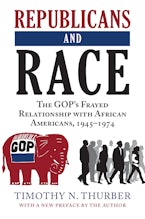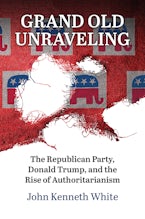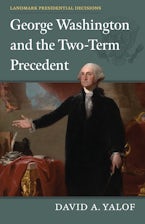"Presents a compelling case that the relationship between African Americans and Republicans is more complex and entrenched than historians have realized."—Journal of Southern History
"For a sweeping survey of how Republicans have addressed race since 1945, there are few works that rival Thurber’s in terms of detailed, yet sweeping, political history. That the work is extremely well written, and a genuinely engaging read, is only an additional incentive to read what is already an invaluable contribution reshaping our understanding of post–World War II politics."—Register of the Kentucky Historical Society
"In an important book on a tricky subject, Thurber charts the Republican racial odyssey from the Truman to Nixon years, and the transformation of the Republican party itself. Historians and general readers alike should welcome this definitive history that illuminates a contested, oft-misunderstood chapter of American politics."—Publishers Weekly
"Balanced, provocative, well-written, and impeccably researched."—Choice
"Subtle and encyclopedic, the book steeps readers in this period of great change, from Adolf Hitler’s surrender to President Nixon’s resignation, as the Civil Rights Revolution transformed America."—Journal of Interdisciplinary History
"Thurber’s book is a nice addition to the burgeoning historical and political science literature on post-1940s American conservatism. It puts the southern strategy, as it is sometimes called, into a needed historical context and shows that the Republican party was never as monolithic on the question of race as is often assumed."—Journal of American History
"Through exhaustive archival research and nuanced, effective analysis, Timothy N. Thurber charts the final collapse of the relationship between the party of Lincoln and African Americans."—American Historical Review
"An original and welcome insight into the Republican party’s role during a ‘distinct era’ in the battle for black equality."—Journal of American Studies
"Republicans and Race should find a welcome home with a range of scholars who work on modern US political history, African American history, civil rights studies, modern conservatism, and post-WWII America generally."—H-Net Reviews
“A monumental work. For decades to come, this will be the definitive study of the Republican Party and race in the years following World War II. It is exhaustively researched, meticulously written, and slays a bucketful of myths on the subject.”—David Nichols, author of A Matter of Justice: Eisenhower and the Beginning of the Civil Rights Revolution
“A fresh examination, full of new insights and great nuance. Readers will learn that many of the stereotypes about the Republican Party and race just are not accurate.”—Donald T. Critchlow, author of The Conservative Ascendancy
“Rich in detail, incident, and insight, Thurber’s splendid work explains the misperceptions and missed opportunities that led to the widening gulf between the Party of Lincoln and the nation’s minorities. A judicious and essential history, full of contemporary resonance.”—Geoffrey Kabaservice, author of Rule and Ruin: The Downfall of Moderation and the Destruction of the Republican Party from Eisenhower to the Tea Party
“The most deeply researched and nuanced history to date of how the GOP’s national leadership dealt with, or failed to deal with, the African American freedom struggle in the three decades following World War II. Thurber moves far beyond the impressionistic histories of the Republican southern strategy to show how liberal, moderate, and conservative Republicans were arguing over what was to become of Lincoln’s legacy. Essential reading for anyone trying to understand the history behind the common perception today of the GOP as a superannuated party of white folks.”—Joseph Crespino, author of Strom Thurmond’s America












